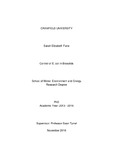JavaScript is disabled for your browser. Some features of this site may not work without it.
| dc.contributor.advisor | Tyrrel, Sean | |
| dc.contributor.author | Fane, Sarah Elizabeth | |
| dc.date.accessioned | 2017-04-26T08:47:05Z | |
| dc.date.available | 2017-04-26T08:47:05Z | |
| dc.date.issued | 2016-11 | |
| dc.identifier.uri | http://dspace.lib.cranfield.ac.uk/handle/1826/11815 | |
| dc.description.abstract | Achieving microbial compliance levels in biosolids storage is complicated by the unpredictable increase of Escherichia coli (E. coli), which serves as an important indicator for pathogen presence risk. Meeting required microbial specifications validates sludge treatment processes and ensures that a safe product is applied to agricultural land. Controlled indicator monitoring provides confidence for farmers, retailers and the food industry, safeguarding the sludge-to-land application route. Following mechanical dewatering biosolids products are stored before microbial compliance testing permits agricultural application. During storage, concentrations of E. coli bacteria can become elevated and prevent the product from meeting the conventional or enhanced levels of treatment outlined in The Safe Sludge Matrix guidelines. Literature research identified innate characteristics of sludge and ambient environmental parameters of storage which are factors likely to influence E. coli behaviour in stored biosolids. The research hypothesis tested whether E. coli growth and death in dewatered sewage sludge can be controlled by the modification of physical-chemical factors in the cake storage environment. Parameters including nutrient availability, temperature, moisture content and atmospheric influences were investigated through a series of laboratory-scale experiments. Controlled dewatering and the assessment of modified storage environments using traditional microbial plating and novel flow cytometry analysis have been performed. At an operational scale, pilot trials and up-scaled monitoring of the sludge storage environment have been conducted enabling verification of laboratory results. Understanding the dynamics of cell health within the sludge matrix in relation to nutrient availability has provided a valuable understanding of the mechanisms that may be affecting bacterial growth post-dewatering. The importance of elevated storage temperatures on E. coli death rates and results showing the benefits of a controlled atmosphere storage environment provide important considerations for utilities. | en_UK |
| dc.language.iso | en | en_UK |
| dc.publisher | Cranfield University | en_UK |
| dc.rights | © Cranfield University, 2016. All rights reserved. No part of this publication may be reproduced without the written permission of the copyright holder. | en_UK |
| dc.subject | Biosolids | en_UK |
| dc.subject | Compliance | en_UK |
| dc.subject | Safe sludge matrix | en_UK |
| dc.subject | Storage | en_UK |
| dc.subject | Mechanical dewatering | en_UK |
| dc.subject | Temperature | en_UK |
| dc.subject | Cell disruption | en_UK |
| dc.title | Control of E.coli in biosolids | en_UK |
| dc.type | Thesis or dissertation | en_UK |
| dc.type.qualificationlevel | Doctoral | en_UK |
| dc.type.qualificationname | PhD | en_UK |
